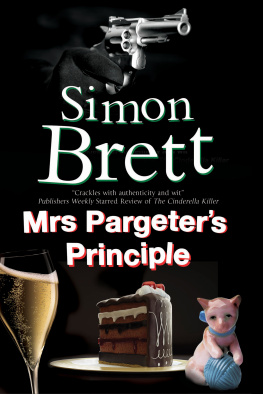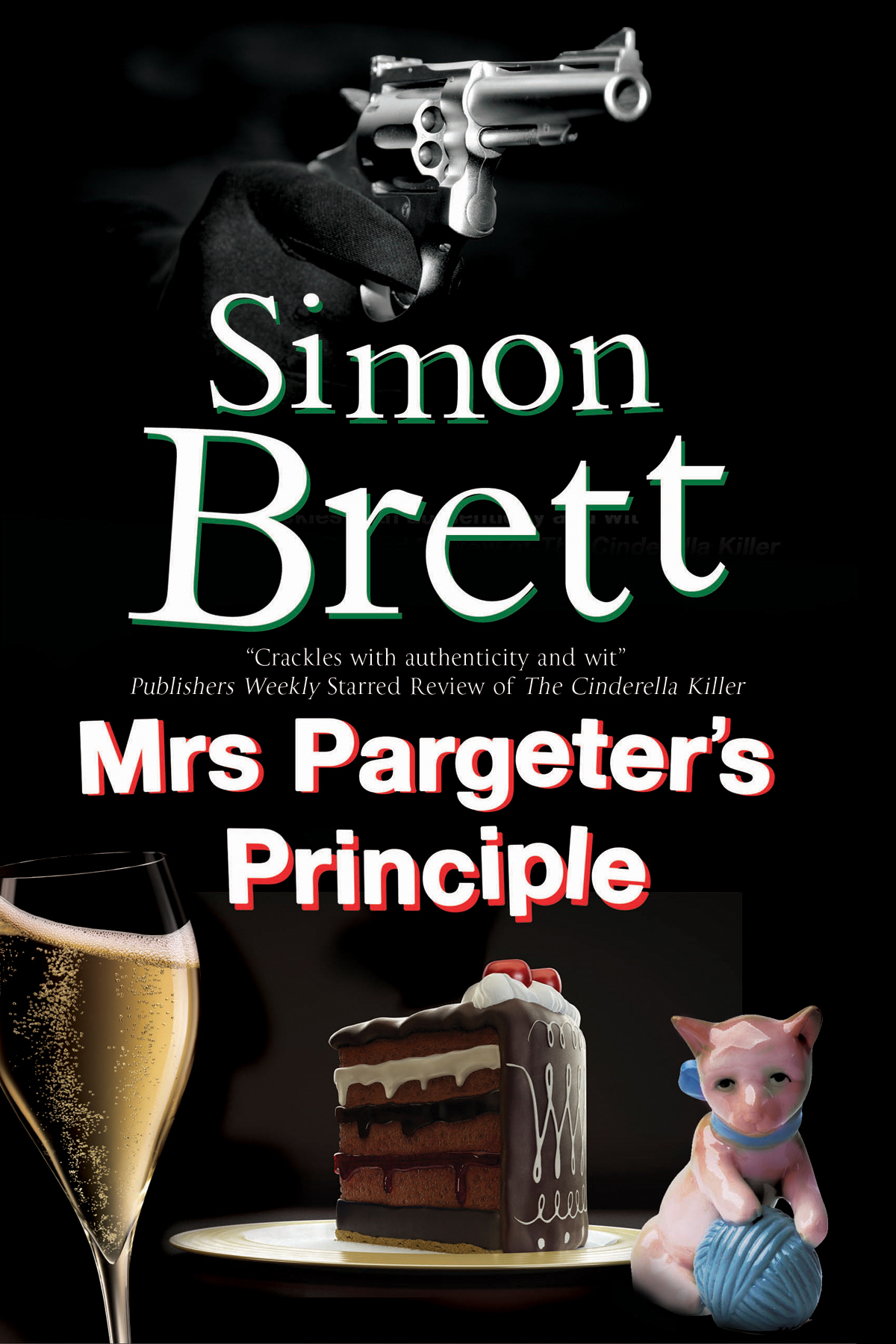MRS PARGETERS PRINCIPLE
A Mrs Pargeter Mystery
Simon Brett

This ebook is copyright material and must not be copied, reproduced, transferred, distributed, leased, licensed or publicly performed or used in any way except as specifically permitted in writing by the publishers, as allowed under the terms and conditions under which it was purchased or as strictly permitted by applicable copyright law. Any unauthorised distribution or use of this text may be a direct infringement of the authors and publishers rights and those responsible may be liable in law accordingly.
This first world edition published 2015
in Great Britain and the USA by
SEVERN HOUSE PUBLISHERS LTD of
19 Cedar Road, Sutton, Surrey, England, SM2 5DA.
Trade paperback edition first published 2015 in Great
Britain and the USA by SEVERN HOUSE PUBLISHERS LTD.
eBook edition first published in 2015 by Severn House Digital
an imprint of Severn House Publishers Limited
Copyright 2015 by Simon Brett.
The right of Simon Brett to be identified as the author of this work has been asserted in accordance with the Copyright, Designs & Patents Act 1988.
British Library Cataloguing in Publication Data
Brett, Simon author.
Mrs Pargeters principle.
1. Pargeter, Mrs. (Fictitious character)Fiction.
2. Women detectivesFiction. 3. Detective and mystery stories.
I. Title
823.92-dc23
ISBN-13: 978-1-78029-074-4 (cased)
ISBN-13: 978-1-78029-557-2 (trade paper)
ISBN-13: 978-1-78010-653-3 (e-book)
Except where actual historical events and characters are being described for the storyline of this novel, all situations in this publication are fictitious and any resemblance to living persons is purely coincidental.
This ebook produced by
Palimpsest Book Production Limited, Falkirk,
Stirlingshire, Scotland.
To Liz and her mother,
persons of discrimination
(because they like my books)
And to Jenny Nagle who won in a charity auction
at Westonbirt School in aid of the
James Hopkins Trust
the right to have her name included in this book
ONE
G iven the fact that they were all at a funeral, it was a surprisingly jolly occasion. But then Sir Normington Winthrop had led a very happy and full life considerably fuller, in fact, than many of the mourners in the Abbey knew.
Certainly fuller than his widow knew. It had been a second marriage for Normington, and Helena, the new Lady Winthrop, fearful of feeling jealous of his deceased first wife and for other reasons best known to herself, had enquired very little about her husbands past.
Which, in the view of a few people attending his funeral, was probably all to the good.
The congregation that April morning represented quite a wide spectrum of society. Cabinet ministers and City magnates filled the front few pews. Then there were representatives of the many charities to which Sir Normington had devoted so much of his money and time, as well as members of his livery companies. Business associates, many in the white robes of their Middle Eastern origins, occupied more pews. And any spaces left were filled with more of the Great and the Good.
But one row contained three people who looked different from the rest. Not out of place exactly, but different. The focus of the group, to whom the two men seemed to defer, was a comfortingly plump woman wearing a black dress with a design of bright-red poppies on it, which contrived to look both striking and respectful of the occasion. A black straw hat and some fairly elaborate jewellery added to the ensemble. And black high heels showed off surprisingly well-shaped legs.
On her right sat a good-looking young man in a dark chauffeurs uniform. To the other side of her was a tall, lugubrious man with the mournful expression of a bloodhound for whom the Botox hadnt worked. He was slightly scruffily dressed, but did have a black tie anchored round his crumpled shirt collar. The expression on the face of each man, when looking at the woman, demonstrated a devotion little short of adoration.
The womans name was Mrs Pargeter.
The chauffeur beside her was called Gary. He ran a very busy car-hire company, but he always saw to it that he was personally available when Mrs Pargeter required transport.
The tall man was a private detective called Truffler Mason. The one thing the two men had in common was that they had both worked for Mrs Pargeters late husband. And she had found them entered into the most valuable bequest that her husband had left her a little black book containing the names of all his associates with descriptions of their specialist abilities. It was amazing what services she could access through that little black book, where names and contacts were stored under such headings as Lock Specialists, Missing Persons Investigators or Armourers.
The little black book, indeed, provided the sole reason why Mrs Pargeter was attending the funeral. The name of Normington Winthrop appeared in its pages, and she thought the possibility unlikely that there were many Normington Winthrops around, so when she read the obituary and funeral notice in the Daily Mail Mrs Pargeter decided she had to attend. It was a matter of principle for her to show proper respect to anyone who had worked for her late husband. Besides, it was the kind of occasion where she might well meet other of the late Mr Pargeters associates. And if she found any of them suffering any kind of hardship, Mrs Pargeter regarded it as another matter of principle to provide help for them. She was really just carrying on her husbands unfinished business.
And if either of the men sitting in the row with her had been asked what the late Mr Pargeters business actually was, each one of them would unhesitatingly have replied that he was a philanthropist.
A fleet of limousines took the mourners from the Abbey to an exclusive hotel near Victoria Station (rumoured to be patronized by minor royals for saucy frolics), where in a private room the post-funeral drinks would be consumed.
Helena Winthrop, in designer black, did not look prostrated by grief, but then she had been brought up in the upper-class British tradition that any display of emotion was unseemly and embarrassing. Also, her face no longer had the capacity for much change of emotion. Feeling the approach of age, shed had some work done, which had left her with an expression of permanent surprise at how old she was.
She had acted as hostess at many public events for her husband and appeared to bring the same professionalism to this one as she had to all the others. The absence of Sir Normington on this occasion was not something to which she thought attention should be drawn though her guests did seem to want to keep talking about him.






![Simon Brett [Simon Brett] - Mrs., Presumed Dead](/uploads/posts/book/142159/thumbs/simon-brett-simon-brett-mrs-presumed-dead.jpg)
![Simon Brett [Simon Brett] - Mrs. Pargeter’s Pound of Flesh](/uploads/posts/book/142156/thumbs/simon-brett-simon-brett-mrs-pargeter-s-pound.jpg)
![Simon Brett [Simon Brett] - Mrs. Pargeter’s Point of Honour](/uploads/posts/book/142155/thumbs/simon-brett-simon-brett-mrs-pargeter-s-point.jpg)
![Simon Brett [Simon Brett] - Mrs. Pargeter’s Plot](/uploads/posts/book/142154/thumbs/simon-brett-simon-brett-mrs-pargeter-s-plot.jpg)
![Simon Brett [Simon Brett] - Mrs. Pargeter’s Package](/uploads/posts/book/142153/thumbs/simon-brett-simon-brett-mrs-pargeter-s.jpg)
![Simon Brett [Simon Brett] - A Nice Class of Corpse](/uploads/posts/book/142089/thumbs/simon-brett-simon-brett-a-nice-class-of-corpse.jpg)


